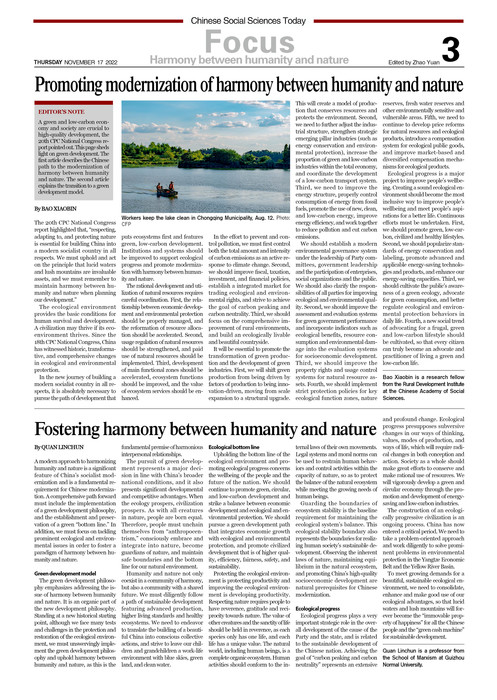Fostering harmony between humanity and nature
2022-11-17 15:22:58
By QUAN LINCHUN
A modern approach to harmonizing humanity and nature is a significant feature of China’s socialist modernization and is a fundamental requirement for Chinese modernization. A comprehensive path forward must include the implementation of a green development philosophy, and the establishment and preservation of a green “bottom line.” In addition, we must focus on tackling prominent ecological and environmental issues in order to foster a paradigm of harmony between humanity and nature.
Green development model
The green development philosophy emphasizes addressing the issue of harmony between humanity and nature. It is an organic part of the new development philosophy. Standing at a new historical starting point, although we face many tests and challenges in the protection and restoration of the ecological environment, we must unswervingly implement the green development philosophy and uphold harmony between humanity and nature, as this is the fundamental premise of harmonious interpersonal relationships.
The pursuit of green development represents a major decision in line with China’s broader national conditions, and it also presents significant developmental and competitive advantages. When the ecology prospers, civilization prospers. As with all creatures in nature, people are born equal. Therefore, people must unchain themselves from “anthropocentrism,” consciously embrace and integrate into nature, become guardians of nature, and maintain safe boundaries and the bottom line for our natural environment.
Humanity and nature not only coexist in a community of harmony, but also a community with a shared future. We must diligently follow a path of sustainable development featuring advanced production, higher living standards and healthy ecosystems. We need to endeavor to translate the building of a beautiful China into conscious collective actions, and strive to leave our children and grandchildren a work-life environment with blue skies, green land, and clean water.
Ecological bottom line
Upholding the bottom line of the ecological environment and promoting ecological progress concerns the wellbeing of the people and the future of the nation. We should continue to promote green, circular, and low-carbon development and strike a balance between economic development and ecological and environmental protection. We should pursue a green development path that integrates economic growth with ecological and environmental protection, and promote civilized development that is of higher quality, efficiency, fairness, safety, and sustainability.
Protecting the ecological environment is protecting productivity and improving the ecological environment is developing productivity. Respecting nature requires people to have reverence, gratitude and reciprocity towards nature. The value of other creatures and the sanctity of life should be held in reverence, as each species only has one life, and each life has a unique value. The natural world, including human beings, is a complete organic ecosystem. Human activities should conform to the internal laws of their own movements. Legal systems and moral norms can be used to restrain human behaviors and control activities within the capacity of nature, so as to protect the balance of the natural ecosystem while meeting the growing needs of human beings.
Guarding the boundaries of ecosystem stability is the baseline requirement for maintaining the ecological system’s balance. This ecological stability boundary also represents the boundaries for realizing human society’s sustainable development. Observing the inherent laws of nature, maintaining equilibrium in the natural ecosystem, and promoting China’s high-quality socioeconomic development are natural prerequisites for Chinese modernization.
Ecological progress
Ecological progress plays a very important strategic role in the overall development of the cause of the Party and the state, and is related to the sustainable development of the Chinese nation. Achieving the goal of “carbon peaking and carbon neutrality” represents an extensive and profound change. Ecological progress presupposes subversive changes in our ways of thinking, values, modes of production, and ways of life, which will require radical changes in both conception and action. Society as a whole should make great efforts to conserve and make rational use of resources. We will vigorously develop a green and circular economy through the promotion and development of energy-saving and low-carbon industries.
The construction of an ecologically progressive civilization is an ongoing process. China has now entered a critical period. We need to take a problem-oriented approach and work diligently to solve prominent problems in environmental protection in the Yangtze Economic Belt and the Yellow River Basin.
To meet growing demands for a beautiful, sustainable ecological environment, we need to consolidate, enhance and make good use of our ecological advantages, so that lucid waters and lush mountains will forever become the “immovable property of happiness” for all the Chinese people and the “green cash machine” for sustainable development.
Quan Linchun is a professor from the School of Marxism at Guizhou Normal University.


